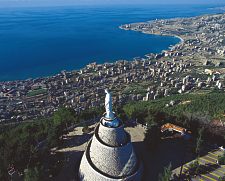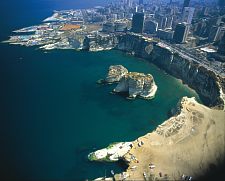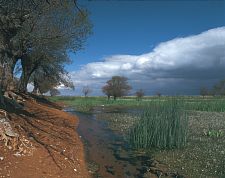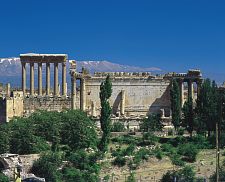|





| |
Lebanon feels heat of Sunni-Shiite friction
by Jeffrey Stinson*
USA TODAY | 12/7/2006
BEIRUT — Lebanon's week-long political crisis is driving a deep and
potentially violent wedge between Shiite and Sunni Muslims like this nation
hasn't seen before.
"This is the worst ever," Abdo Saad, director of the Beirut Center for Research
and Information, says of the rift. "It's very dangerous."
The political crisis reflects the growing influence of Shiites, and as in all
matters political in Lebanon, there are religious overtones to the conflict.
"Sectarian tensions are high," says Mohammed Kalhani, a Sunni member of the
majority coalition in parliament. "Shiites and Sunnis are opposing each other.
That's something we never found in the past."
After decades of fighting in Lebanon that pitted its many groups against each
other, clear Sunni-Shiite fault lines have emerged over the past few months as
Hezbollah, a militant group, has launched a forceful effort to gain more power
for itself and other Shiites and, opponents say, for its key supporters: Syria
and Iran.
IN THE STREETS: Opposition calls for massive weekend protest
The crisis is most evident in downtown Beirut. Protesters led by Hezbollah have
camped there for a week and vow to stay until the government resigns and gives
them greater say over policy. The government, led by Prime Minister Fuad Saniora,
a Sunni, refuses to give in.
The divisions can be seen and heard across the capital — in places such as the
Shiite neighborhood of Haret Hreyk and the predominantly Sunni district of Tarik
el Jdideh.
Hezbollah support
In Haret Hreyk, Housain Baroud, 35, a Shiite who runs a restaurant that sells
sandwiches, says the split with Sunnis is palpable since the political struggle
mushroomed.
A cold politeness characterizes even simple transactions among Muslims. "The
tension, you see it now," he says after making change for a Sunni who walked in
but didn't buy anything.
Baroud supports Hezbollah and its effort to gain greater political power in the
government. The reasons, he says, are clear, pointing at the new floor, ceiling,
tables and marble counter in his restaurant.
Half of it was paid for by a $3,000 grant from Hezbollah, which offered to help
Baroud after the restaurant was badly damaged during the militant group's 34-day
fight with Israel in the summer. The government has given him nothing, Baroud
says.
Much of Hezbollah's newfound support comes from the conflict that erupted after
the group, which is armed and gets financial support from Syria and Iran, staged
a cross-border raid and captured two Israeli soldiers July 12. The two soldiers'
whereabouts remain unknown. Israel sent forces into Lebanon and launched a
bombing campaign aimed at neutralizing Hezbollah.
Israeli airstrikes flattened or damaged dozens of buildings in mainly Shiite
southern Beirut, including Haret Hreyk. Buildings, many of them pockmarked from
shrapnel, are separated by empty lots where businesses and apartment blocks once
stood.
Israel failed to uproot the militant group, which saw its prestige grow among
Shiites and other Lebanese as a result of its staying power. A cease-fire
declared Aug. 14 ended the conflict. "I'm with Hezbollah 100%," Baroud says.
"Hezbollah means to us dignity. They held off Israel."
That support may translate power on the battlefield into political gains for
Shiites, who represent at least 32% of Lebanon's population, according to Saad
of the Beirut Center.
Baroud is among Lebanon's Shiites who say they have been ignored by Sunni-led
governments and the time has come — thanks to Hezbollah — for better
representation. "How can you live in harmony and some people feel that others
don't exist?" he asks.
Government support
The mood is darker in the Tarik el Jdideh area of West Beirut, a mostly Sunni
area. It's been tense here since Sunday, when a Shiite youth was killed by
gunfire while he passed through the district on his way home from the downtown
demonstrations.
Tanks, armored vehicles and troops have set up checkpoints and barricades around
Tarik el Jdideh. "Day after day, it is becoming more tense," says Mohamad
Housami, 28, who works in a fruit-drink bar.
Housami says the cause of the widening divide between Sunni and Shiite Muslims
is clear. "The Shiites have become more radical," he says. "If things keep the
way they are going, it could be civil war: Muslims against Muslims."
Support for Saniora's government runs deep here. His governing coalition of
Sunnis, Christians and Druse, was elected on an anti-Syria platform after
Damascus ended its nearly 30-year occupation of Lebanon. The withdrawal of
Syrian troops was prompted by protests after the assassination of former prime
minister Rafik Hariri, a Sunni critic of Syria's presence.
Resentment toward Hezbollah is high here — and not just because some Sunnis fear
Syria could regain control of Lebanese affairs if Hezbollah gets the power it
seeks.
There's also deep-seated resentment against Hezbollah for inciting the summer
war with Israel. The conflict caused $2.8 billion in direct damage to roads,
bridges, businesses and housing. "It was an unforgivable mistake," Mustafa
Abbass, 63, a candy shop owner, says of the war. "Now, (Hezbollah) is trying to
put pressure on the government for more power. This government is legitimate. It
has popular support."
Government supporters such as Abbass suspect Hezbollah is staging its protest to
derail an international tribunal that would try suspects in Hariri's murder.
Hezbollah may also be trying to prevent the implementation of a U.N. resolution
demanding that the group disarm.
President Emile Lahoud and parliament speaker Nabih Berri, both of whom are
pro-Syrian, say the Cabinet has lost its legitimacy since five Hezbollah members
of the government resigned in October. They say the Cabinet no longer represents
Lebanon's religious diversity, as required by the constitution.
The crisis has many worried about the future of Sunni and Shiite relations.
Among them is Nouhad Srouji, 42, a Sunni who owns a clothing shop here. A mother
of three, she is married to a Shiite. She and her husband no longer talk
politics to keep the peace, she says.
"I'm very worried about the situation," she says. "And I'm very worried for my
children. I'm telling them that if they grow up to be Shiite, marry a Shiite."
* Source:
http://www.usatoday.com/news/world/2006-12-07-lebanon-tension_x.htm
|